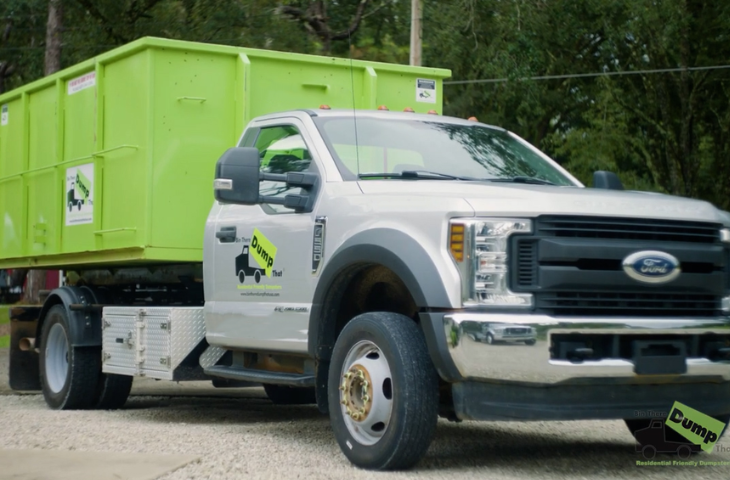Dumpster Rental FAQ: Do I Need A Permit When I Rent A Dumpster?
You're bound to have questions about renting a dumpster, especially if you're doing it for the first time. One of the top ones we get asked is what all is required to have a dumpster at your home. The answer to that depends on a few things.
Do I Need a Permit for a Dumpster?
If you want to put the dumpster on your yard or driveway, you won't always need a dumpster permit. There may be instances where your city may require you to have a permit for a dumpster on your own driveway. However, if you want the operator to leave it on the sidewalk, street or a public alley, you will need to apply for a permit with your city's Public Works Department.
When you want to put a roll-off dumpster in the public right-of-way, here's what you'll need to know about acquiring a permit.
How To Get A Permit
For some construction, renovation or cleanup projects, you may need to place the dumpster somewhere other than your driveway, like on the street or sidewalk.
To legally do that, you'll need to obtain a Public Works, Street Use, Minor Improvements Construction or Road Occupancy permit from your city. Depending on which one your city requires, these permits will allow you to place the dumpster rental in a public space.
You can obtain a permit by visiting your city's Public Works website and filling out an application. The form will require information like your name, address, a sketch of where the dumpster will go, project details and if it's possible to have the dumpster on the property.
Each city will have its own costs and turnaround time on the permit, so make sure you apply early. In Hamilton, Ontario — for example — the processing time for a Road Occupancy permit is a minimum of five days, and it's subject to a $50 fee if approved.
Other cities, like Pittsburgh, Pa., approve applications over the counter and charge $25 per week for residential use.
Keep in mind: Permits may not be valid in some cities during street cleaning or snow emergencies. You will also need to make sure you follow any parking restrictions when placing the dumpster, and keep them away from hydrants (ask your city what distance is allowed).
Find a dumpster permit near you:
What If You Don't Get A Dumpster Permit?
Anytime you place a dumpster on public property, you'll need to acquire a dumpster permit. If you don't, you could face tickets or monetary fines, depending on your city's rules. The city might also impound the dumpster if you don't have a dumpster permit.
City officials can become aware of the issue if a concerned neighbor or bystander contacts the authorities about the dumpster. You will then need to produce your dumpster permit or face a penalty. If you don't pay the fine, you may also face jail time.
Rules For Contractors Vs. Homeowners
No matter if you're a contractor or homeowner, you will need to get a permit to put the bin on the street.
In addition to filling out the application form, if you're a contractor, you will also need to provide proof of worker's compensation and liability insurance certificate naming the city as an additional insured endorsement (in some cities). Check with your municipality to see what is required.
How Long Does A Permit Last?
Each city has different regulations about how long you can leave the dumpster in the public space, so you'll need to see what rules you have locally.
For example, in Rancho Cucamonga, Calif., the city allows the dumpster to be in the street for a maximum of 10 days with a Minor Improvements Construction permit. Other municipalities allow you to pay for weekly permits until the project is finished.
Even if you have a permit, you can face monetary penalties if you exceed the time frame. See what rules your city has for extending the dumpster permit in case you go over schedule.

Choose An Insured Operator
If there's any damage to the street, curb or sidewalk, you will need to repair or pay for the damage.
You don't want to get stuck with that bill, so talk with your local Bin There Dump That franchise about their insurance coverage. The operator will even place boards under the bin to protect the street, or wherever you put the dumpster.
When it comes time to rent a dumpster, a franchise operator can also talk with you about securing a permit or answer any other renting questions you may have.

Related Blog Posts
- Revive Your Home for Spring with This Spring Home Maintenance Checklist
- 10 New Home Trends That Will Make Your Friends Jealous
- How Our Dumpsters Support Realtors and Property Managers: A Comprehensive Guide
- 12 Jaw-Dropping Clutter Statistics That Will Make You Want to Declutter Today!
- Unlocking Space: The Complete Guide on Pocket Door Installation
- Step by Step Guide on How to Install Carpet Like a Pro



